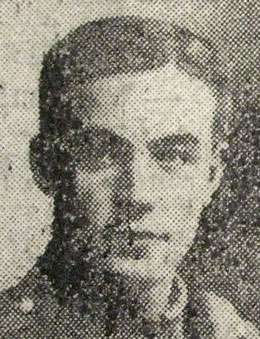Private Joseph Gibson
Joseph Gibson was born on 24 April 1897 at Carrickalwy, Ashfield, County Cavan, the sixth of seven children of farmer Henry Gibson and his wife Elizabeth (nee Ronaldson). His father died when he was just seven years old. By the time of the 1911 Census he was living at Carrickalwy with his mother and three siblings.
Gibson enlisted in the North Irish Horse on 24 or 25 November 1915 (No.1966). He embarked for France in 1916 or the first half of 1917, where he was posted to either the 1st or 2nd North Irish Horse Regiment.
In September 1917 the 2nd North Irish Horse Regiment was disbanded and most of its men, together with some surplus to the needs of the 1st NIH Regiment, were transferred to the 9th (Service) Battalion, Royal Irish Fusiliers – renamed the 9th (North Irish Horse) Battalion. Like most of the men, Gibson was transferred on 20 September. He was issued a new regimental number – 41413 – and posted to A Company. It is likely that he saw action with the battalion at the Battle of Cambrai in November and December 1917.
Gibson was one of the many listed as missing following the 9th (NIH) Battalion's fighting withdrawal from St Quentin to near Amiens from 21 to 28 March 1918. It was later learned that he had been captured, unwounded, on 27 March at Erches, near Roye.
Gibson remained a prisoner until the end of the war, held at camps in Giessen and Limburg.
After the war he worked in business in Northern Ireland. He died on 27 April 1974. The Belfast Telegraph published the following obituary:
Mr. Joseph Gibson, of Regent House, Banbridge Rd., Dromore, who has died in hospital after a brief illness, was one of the town's leading businessmen. He was 77.
He founded the firm of Joseph Gibson and Sons Ltd., millers, grocers, and general merchants with premises at Meeting Street, Dromore.
Mr. Gibson was "father" of Dromore Urban Council when the change-over in local government administration took place last year. He was a former chairman of the council and had also served on various committees including those of county health and education.
An ex-serviceman of World War I, he was prominently identified with the Dromore branch of the Royal British Legion of which he was a founder member. he was a JP and was connected with the Masonic Order.
A member of the Kirk Session of First Dromore Church for 28 years, he served on various other church committees.
Mr. Gibson is survived by his widow, two sons, and a daughter.

At least one of Gibson's brothers, George Arthur, also served in the war.
Image from the Belfast Evening Telegraph, May 1918, kindly provided by Nigel Henderson, Researcher at History Hub Ulster (www.greatwarbelfastclippings.com).

